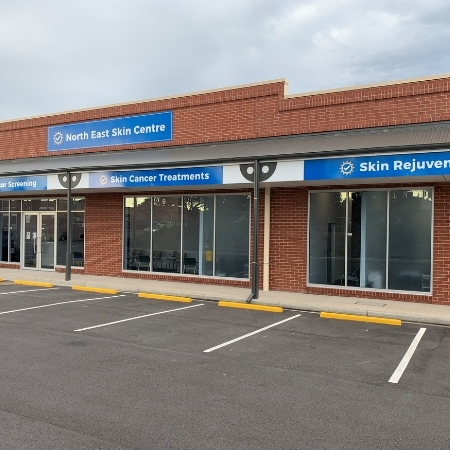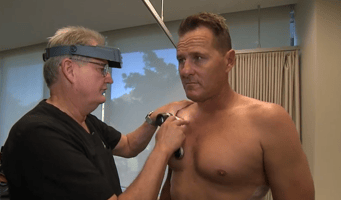Summer brings hotter days, longer daylight hours, and better conditions for enjoying the outdoors....

PLEASE NOTE: The entrance to North East Skin Cancer Centre from Wandana Avenue is currently closed due to road works. Please enter via Grant Avenue until further notice.
We are a private billing clinic. Medicare rebates available.
No referral required.
Opening hours:
Monday to Friday: 8.30am - 5.00pm
Saturday: 9:00am - 1:00pm
Address:
635 North East Road
Gilles Plains, SA 5086
Phone: 08 8396 3398
Email: north.east.reception@skincancercentres.com.au
Parking:
Parking is available out the front of the centre.

North East Skin Cancer Centre is a private billing facility for skin checks in Adelaide. We offer several payment options, including cash, EFTPOS and credit card. For your convenience, we use Medicare online so your rebate will be refunded promptly. Please ask our staff for more information.
With the exception of Gold Card veterans who will be fully bulk billed, patients will fall into one of two categories: Private and Concession which includes healthcare card holders and aged pensioners.
$130 - $167
$50 for single session
At our skin cancer clinic in Adelaide (Gilles Plains), North East Skin Cancer Centre (formerly called Redgum Skin Cancer Clinic), we provide a comprehensive approach to looking after your skin health. The qualified team works primarily in skin cancer diagnosis and treatment, and experienced doctors are supported by a highly trained team of support staff for your optimal care. Following our vision of a world where nobody dies of skin cancer, we deliver the highest standard of care and save lives every day. Our medical team will provide you with expert advice, utmost skill – and most importantly, peace of mind. We can help you with skin cancer screening and diagnosis, total body photography, surgical and non-surgical skin cancer treatments, sun damage repair, mole removal, and wound and scar management.
Conveniently located next to Officeworks Gilles Plains, just 30 minutes from the Adelaide CBD, free on-site parking is available at the front door. If you arrive by car, entry via Wandana Avenue is best. If you're taking public transport, the nearest bus stop is just around the corner at Stop 32 North East Rd.
Your health and satisfaction are at the forefront of everything we do. We understand that all patients have varying requirements and aspirations; therefore, we will always tailor your care plan for you and work hard to exceed your expectations. Thank you for choosing us for your skin check in Adelaide!


Summer brings hotter days, longer daylight hours, and better conditions for enjoying the outdoors....

With summer approaching, it is important to remember that exposure to the sun can seriously harm...

“We are the number one country in the world for skin cancers. It's a preventable cancer. It just...
Milia cysts can sometimes look like pimples. Milia cysts are benign - that is, they are not skin cancer. If you are concerned about a lesion on your skin, get it checked as soon as possible by a doctor.
Conveniently located next to Officeworks Gilles Plains, North East Skin Cancer Centre in Gilles Plains is just 30 minutes from the Adelaide CBD. Free on-site parking is available at the front door. If you arrive by car, entry via Wandana Avenue is best. If you're taking public transport, the nearest bus stop is just around the corner at Stop 32 North East Rd.
Doctors with advanced training in skin cancer medicine perform comprehensive skin checks in dedicated facilities that are fully equipped to diagnose, biopsy and treat all skin cancers using the latest tools and technologies for earliest diagnosis. They have advanced qualifications and dedicate their practise full-time to skin cancer management.
Annual professional skin cancer checks are the rule of thumb for most people living in Australia from the age of sixteen. However, you may require more frequent skin checks if you have had skin cancer before or if your doctor identifies that you are at high risk. In that case, you may require skin checks every three to six months. Other people at very low risk of skin cancer (as advised by a doctor) may be able to go two years without a skin check, but you should check with your doctor about what is best for you. In between professional full-body checks, you should self-monitor for new or changing lesions and show your doctor immediately if anything develops, even if you are not due for your regular skin check yet.
Wear clothes that are easy to take on and off - that is, no complicated buttons, time-consuming laces or fiddly garments. Do not wear makeup. You can keep your underwear on during your full-body skin exam. You will be required to undress down to your underwear, and you will be given a gown or sheet for modesty so you are never fully unclothed at one time. If you are not comfortable undressing, you can remove your clothes as much as possible. The more skin we can see, the more thorough the skin check will be. You may bring a chaperone into the room with you. If there is a lesion under your underwear that you would like checked, please let the doctor know.
WHY CHOOSE US